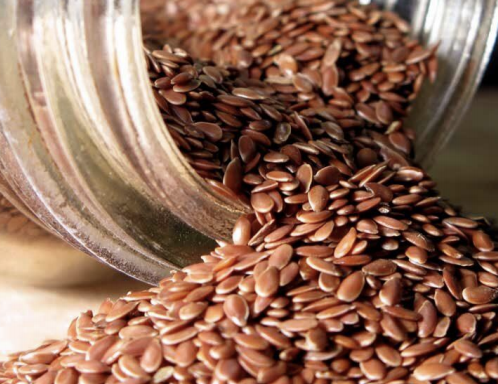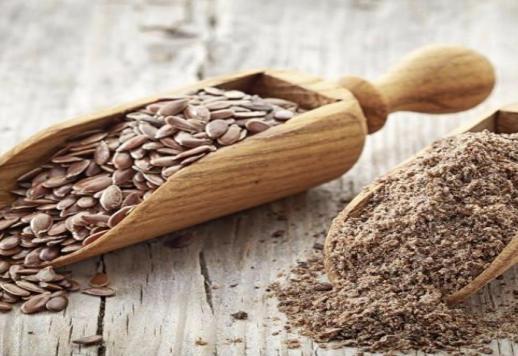 Flaxseeds have been used in cooking for centuries, and there are records describing their use and health-protective properties dating as far back as Ancient Greece. So it could be called the original superfood, indeed! Why should we add flaxseed to our diet? Well, here are some health benefits of flax seeds.
Flaxseeds have been used in cooking for centuries, and there are records describing their use and health-protective properties dating as far back as Ancient Greece. So it could be called the original superfood, indeed! Why should we add flaxseed to our diet? Well, here are some health benefits of flax seeds.
1. Flax Seeds Are High in Omega-3 Fats — They are a rich source of alpha-linolenic acid (ALA), a mostly plant-based omega-3 fatty acid. ALA is one of the two essential fatty acids that you have to obtain from the food you eat because your body doesn’t produce them. Studies have shown that the ALA in flax seeds prevented cholesterol from being deposited in the blood vessels of the heart, reduced inflammation in the arteries, reduced tumor growth, and lowered the risk of a stroke.
2. Flax Seeds Are a Rich Source of Lignans, Which May Reduce Your Cancer Risk — Lignans are plant compounds that have antioxidant and estrogen properties, which can help lower the risk of cancer. Flax seeds contain up to 800 times more lignans than other plant foods. Studies show that flax seeds are a potentially valuable food in the fight against various cancers.
3. Flax Seeds Are Rich in Dietary Fiber — Just one tablespoon of flax seeds contains 3 grams of fiber, soluble (20–40%) and insoluble (60–80%). With so much fiber in each tiny seed, adding flax seeds to your diet promotes regular bowel movements and can improve your digestive health.
4. Flax Seeds May Improve Cholesterol — Another health benefit of flax seeds is their ability to lower cholesterol levels. In one study in people with high cholesterol, consuming 3 tablespoons of flaxseed powder daily for three months lowered total cholesterol by 17% and “bad” LDL cholesterol by almost 20%. Another study of people with diabetes found that taking 1 tablespoon of flaxseed powder daily for one month resulted in a 12% increase in “good” HDL cholesterol. This is definitely good news for those wanting to improve their cholesterol.
5. Flax Seeds May Lower Blood Pressure — Studies on flax seeds have also focused on their natural ability to lower blood pressure. According to one study, taking flaxseeds daily for more than three months lowered blood pressure by 2 mmHg, which can lower the risk of dying from stroke by 10% and from heart disease by 7%.
6. They Contain High-Quality Protein — Flax seeds are a great source of plant-based protein, rich in the amino acids arginine, aspartic acid, and glutamic acid. Numerous studies have shown that flaxseed protein helped improve immune function, lowered cholesterol, prevented tumors, and had anti-fungal properties. Flax seeds are a good source of plant-based protein and can be an alternative protein source for people who do not eat meat.
7. Flax Seeds May Help Control Blood Sugar — A few studies have found that people with type 2 diabetes who added 10–20 grams of flaxseed powder to their daily diet for at least one month saw reductions of 8–20% in blood sugar levels. This blood sugar-lowering effect is notably due to flax seeds’ insoluble fiber content. Research has found that insoluble fiber slows down the release of sugar into the blood and reduces blood sugar. Overall, flax seeds can be a beneficial and nutritious addition to the diet of people with diabetes.
8. Flax Seeds Keep Hunger at Bay, Which May Aid In Weight Control — If you have the tendency to snack between meals, you might want to add flax seeds to a beverage to keep hunger pangs at bay. The soluble fiber content of flax seeds slows digestion in the stomach, which triggers hormones that control appetite and provide a feeling of fullness. Flax seeds keep you full for longer and may help you manage your weight by controlling your appetite.
 When it comes to nutritional goodness, flax seeds are full of it. Although they are tiny, they are rich in the omega-3 fatty acid ALA, lignans, and fiber, all of which have been shown to have many potential health benefits. They can be used to improve digestive health, lower blood pressure, and bad cholesterol, reduce the risk of cancer, and may benefit people with diabetes. With many proven health benefits and possibly more, there’s no better time than now to add some flaxseeds to your diet.
When it comes to nutritional goodness, flax seeds are full of it. Although they are tiny, they are rich in the omega-3 fatty acid ALA, lignans, and fiber, all of which have been shown to have many potential health benefits. They can be used to improve digestive health, lower blood pressure, and bad cholesterol, reduce the risk of cancer, and may benefit people with diabetes. With many proven health benefits and possibly more, there’s no better time than now to add some flaxseeds to your diet.

